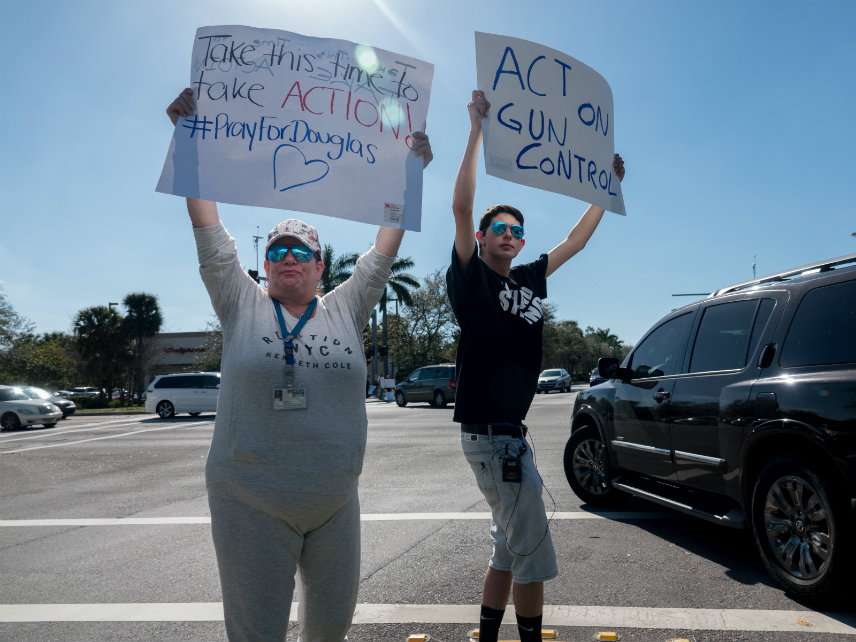A Cure for Mass Shootings Doesn't Exist
There are no plausible options that offer more than the faintest prospect of preventing the next massacre.

Every time there is a mass shooting, a chorus goes up: "We must do something to keep this from happening again. We can't tolerate it any longer."
Revulsion understandably creates a demand for remedies. But every time, we do nothing, to the fury of those who denounce the inaction as shameful.
There is a simple explanation, though, for the inaction. It's not that the National Rifle Association is all-powerful, that too many Americans are blind to reason, or that most are complacent about wanton slaughter. It's that there are no plausible options that offer more than the faintest prospect of preventing a massacre in the next year or the next decade.
Our constitutional framework was not designed to facilitate drastic government action. It was designed to prevent it in the absence of a clear and durable public consensus. In this instance, there is none.
Mass shootings are a horrific problem that is peculiarly resistant to solutions. To a great extent, public policy is impotent. Until the advocates of new restrictions can make the case that they would make a difference, little is likely to happen.
What answers do they offer? One is reinstituting the federal ban on "assault weapons" and high-capacity magazines that was in effect from 1994 to 2004. Another is expanding the federal background check system to cover private sales. Another is to make it easier to flag people with mental health problems and bar sales to them.
These are not necessarily wrong, but they are unpromising. Though an AR-15 may be particularly useful for mass shootings, there are many substitutes that fire just as rapidly and use equally destructive ammunition. A ban on high-capacity magazines would be a puny impediment to someone like the killer in Parkland, Florida.
Mass shooters, Florida State University criminologist Gary Kleck told me, "always use multiple guns and/or multiple magazines, enabling them to easily fire many rounds quickly even if they had only smaller-capacity magazines. And they do not need guns that fire fast, because they do not fire fast during their crimes." The Parkland shooter had multiple magazines.
A 2013 study of the 1994 law for the National Institute of Justice said, "We cannot clearly credit the ban with any of the nation's recent drop in gun violence." It also said, "Should it be renewed, the ban's effects on gun violence are likely to be small at best and perhaps too small for reliable measurement."
Even if the law had any positive effect then, it would be far less likely to help today, because there are far more of these guns now. In 1994, Americans owned about 1.5 million "assault weapons." The number is now around 8 million.
Restoring the 1994 law would not eliminate them. It would only block new sales—and foster new models engineered to get around the new rules. People would be able to keep and buy the "assault weapons" already out there.
Background checks for private sales would make it harder for felons to acquire guns. But mass shooters have typically gotten their arms legally from licensed dealers as the alleged killer in Parkland did.
Yes, it might make a difference if the United States emulated Australia by outlawing certain guns and requiring owners to surrender them. Constitutional issues aside, that sort of law couldn't be passed here—or enforced. It belongs in the realm of fantasy.
Broadening the exclusion for mental health problems would mean penalizing millions of people who pose no danger. It would also deter troubled gun owners from seeking treatment.
"To say no one with mental illness should have a gun—how do you accomplish that?" Ronald Honberg, senior policy adviser for the National Alliance on Mental Illness, asked The New York Times. "Does that mean anybody that goes to a therapist for depression or anxiety should be reported and put in a database and prohibited from purchasing a firearm? That would impact a fair number of police officers."
None of this is to argue against any changes whatsoever. Some reforms could modestly reducing gun crime without putting much of a burden on law-abiding gun owners. Universal background checks, banning bump stocks, and improving databases to prevent the omission of people who are barred from purchasing guns could help diminish gun violence.
Outrage is an appropriate response to the carnage in Parkland, but it's not an answer. Those demanding dramatic action accuse those who disagree of enabling murder. But it's no sin to reject false remedies.
COPYRIGHT 2018 CREATORS.COM


Show Comments (557)